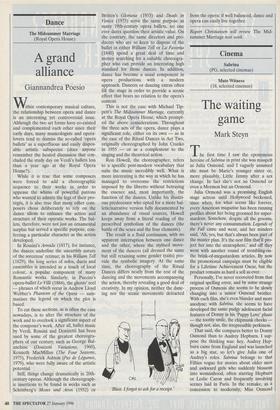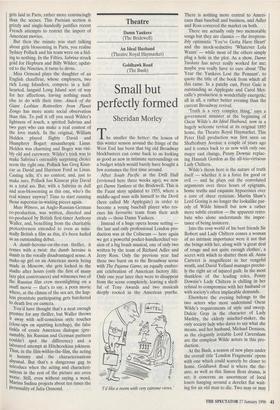Cinema
Sabrina
(PG, selected cinemas)
Mute Witness
(18, selected cinemas)
The waiting game
Mark Steyn
The first time I saw the eponymous heroine of Sabrina in print she was misspelt as Julia Osmond, and I vaguely assumed she must be Marie's younger sister or, more plausibly, Little Jimmy after a sex change. In fact she's not an Osmond or even a Mormon but an Ormond.
Julia Ormond was a promising English stage actress until Hollywood beckoned, since when, for what seems like forever, every American magazine has been running profiles about her being groomed for super- stardom. Somehow, despite all the grooms, there's never any consummation. Legends of the Fall came and went, and her minders said, `Ah, yes, but that's always been part of the master plan. It's the next film that'll pro- ject her into the stratosphere,' and off they went with another round of trembling-on- the brink-of-megastardom articles. By now the promotional campaign must be eligible for a Lifetime Achievement Oscar, but the product remains as hard a sell as ever.
Personally, I've never recovered from that original spelling error, and by some strange process of Osmosis she seems to be slowly changing into a minor Osmond brother. With each film, she's even blander and more anodyne; with Sabrina, she seems to have developed the same pudgy adolescent facial features of Donny in his 'Puppy Love' phase — the toothy smile, the chipmunk cheeks though not, alas, the irrepressible perkiness.
That said, she compares better to Donny Osmond than to Audrey Hepburn. I sup- pose the thinking was: hey, Audrey Hep- burn came from England and was launched as a big star, so let's give Julia one of Audrey's roles. Sabrina belongs to that Fifties vogue for stories about older men and awkward girls who suddenly blossom into womanhood, often starring Hepburn or Leslie Caron and frequently involving scenes laid in Paris. In the remake, as a concession to modernity, Miss Ormond gets laid in Paris, rather more convincingly than the scenes. This Parisian section is grizzly and single-handedly justifies recent French attempts to restrict the import of American movies.
But then the minute you start talking about girls blossoming in Paris, you realise Sydney Pollack and his team were on a hid- ing to nothing. In the Fifties, Sabrina struck gold for Hepburn and Billy Wilder; updat- ed to the Nineties, it turns to dross.
Miss Ormond plays the daughter of an English chauffeur, whose employers, two rich Long Islanders, compete in a half- hearted, languid Long Island sort of way for her affections, having nothing much else to do with their time. Attack of the Giant Lesbian Rottweilers from Planet Zongo has more acute social observation than this. To pull it off you need Wilder's lightness of touch, a spirited Sabrina and two guys who can make a real contest of the love match. In the original, William Holden played flighty David and Humphrey Bogart misanthropic Linus. Holden was charming and Bogey was visi- bly old and careworn: Wilder's trick was to make Sabrina's ostensibly surprising choice seem the right one. Pollack has Greg Kinn- ear as David and Harrison Ford as Linus. Casting tells; it's no contest; and, just to make sure, Pollack has Kinnear play David as a total ass. But, with a Sabrina as dull and non-blossoming as this one, who's the real winner anyway? Time to start running those superstar-in-waiting pieces again.
Mute Witness, an Anglo-Russian-German co-production, was written, directed and co-produced by British first-timer Anthony Waller, and, benefiting from the charitable protectiveness extended to even as mini- mally British a film as this, it's been hailed as an outstanding debut.
A dumb-heroine-on-the-run thriller, it comes with a twist: the dumb heroine is dumb in the vocally disadvantaged sense. A make-up girl on an American movie being made in Moscow, she gets locked in the studio after hours (only the first of many lazy plot contrivances) and witnesses two of the Russian film crew moonlighting on a snuff movie — that's to say, a porn movie where, at the climax of the sex act, the hap- less prostitute participating gets butchered to death live on camera.
You'd have thought that's a neat enough premise for any thriller, but Waller throws it away with self-conscious style touches (close-ups on squirting ketchup), the false tinkle of ersatz American dialogue (pre- sumably, his Russian and German partners couldn't spot the difference) and a laboured attempt at Hitchcockian jokiness. Thus, in the film-within-the-film, the acting is hammy and the characterisations abysmal. But that's a dangerous gag to introduce when the acting and characteri- sations in the rest of the picture are even Worse. Still, even without saying a word, Marina Sudina projects about ten times the personality of Julia Ormond.



























































 Previous page
Previous page